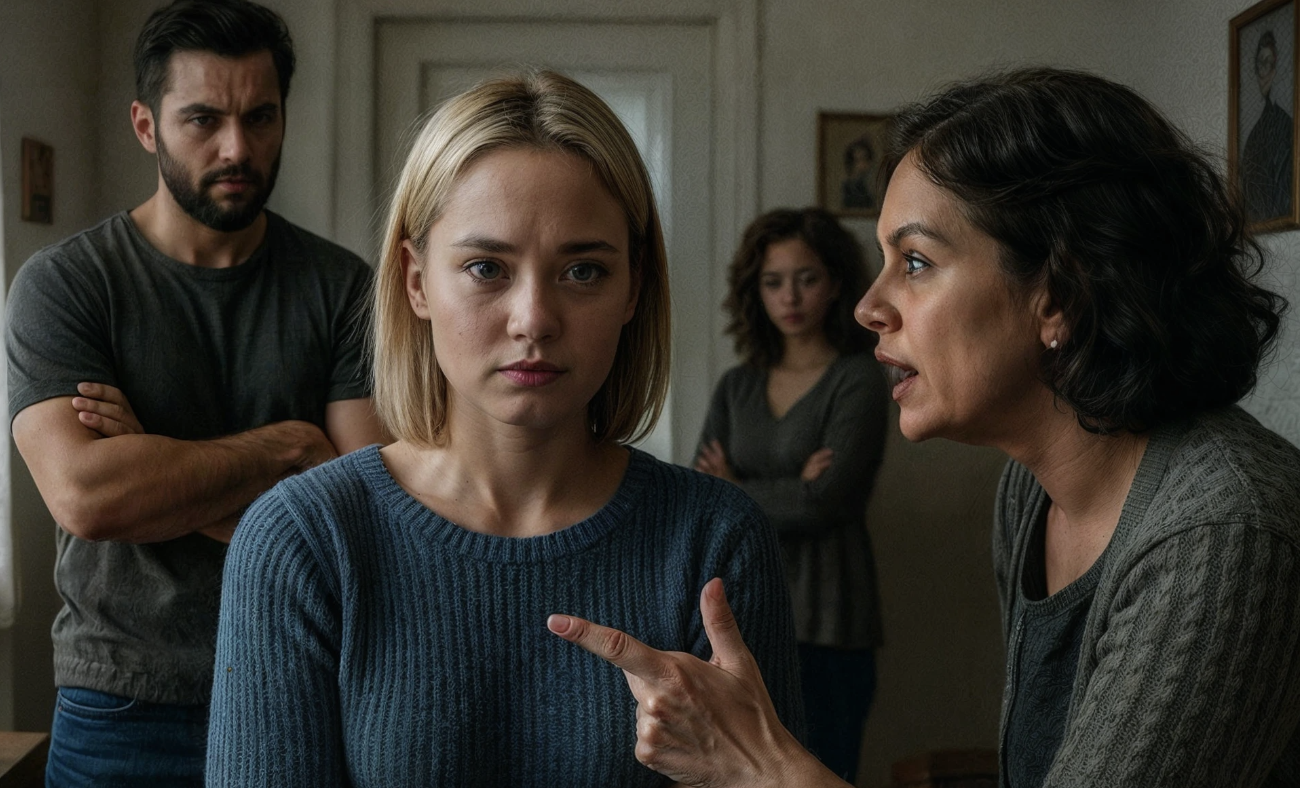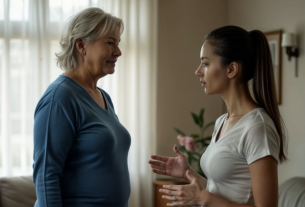Victoria held the key in her hand—small, metal, yet heavy with an entire lifetime. As if it wasn’t a key at all, but a medal for surviving a strange discipline called “five years without joy.” The cold, prickly metal burned her fingers, and not because of the February frost—because of what it meant: every morning without takeout coffee, every winter in worn-out boots, every “no” to herself about little things like a movie ticket or a bun at the station after a night shift. All for those forty and a half square meters on the outskirts—with mildew in the bathroom and a view of an endless row of cars. But hers. Belonging to no one but her.
“Vika!” Olga called, shifting from foot to foot by the door. In one hand she held a cake, in the other—pure impatience. In her eyes burned that familiar female spark that flares up at weddings or in the clearance aisle. “What are you doing in there like you’re about to walk down the aisle? Come on, open it already!”
They’d known each other since the days they sewed doll dresses out of old socks, and when the first kiss wasn’t about feelings but about curiosity and a chemistry lesson. Their chests had grown, their taste in men had gotten worse, and their friendship—though it sometimes turned into a heavy suitcase with no wheels—still dragged itself forward. You couldn’t just abandon it.
“Just a second,” Victoria said, drawing in a deep breath like before diving into cold water. The key clicked in the lock, and the door gave way reluctantly.
Inside were bare walls, linoleum the color of over-fried herring, and stains on the ceiling—like rain had fallen right in the entryway. But Victoria was smiling wide, all the way into the corners of her soul.
“Housewarming, bestie!” Olga burst in like a hurricane and started inspecting the “property.” “Well… there’s a lot of work here, of course—”
“But it’ll all be my way,” Victoria said, taking off her coat as if shedding the past. “And no mother-in-law will tell me where to put a vase.”
They started the renovation cheerfully, with dumb jokes and buckets of paint, like back in their student days. Olga, dropping the roller every other minute, painted the bedroom walls while Victoria battled kitchen tile. Music blared—somewhere between Zemfira and Nautilus—and the apartment smelled of fresh paint, dumplings, and hope.
“Can you imagine what the housewarming will be like?” Victoria daydreamed, stirring paint like a potion.
“With cake and pretty dishes!” Olga called from the stepladder. “And a special-occasion dinner set. Meaning, for every day—because every day is special.”
They bought furniture like they were curating a museum: a solid-wood table, a handwoven rug, a lotus-shaped lamp. Olga dragged in a huge mirror without asking.
“So you remember: you’re beautiful. Even hungover.”
Three months later the renovation was done. Exhausted, in old T-shirts, but with the feeling they’d done something truly important, they celebrated. That was when Victoria met Andrey. Tall, with an ad-ready smile and a voice like evening radio. He asked where the outlet was and poured her wine. Two months later they were dating. A year and a half later he proposed.
The wedding was quiet and tasteful. No stupid contests—just live music and a cake from Olga.
“Well, now you’re a wife,” Olga whispered in the ladies’ room, adjusting the veil. “All that’s left is learning to say ‘darling’ without grinding your teeth.”
“I’m happy,” Victoria answered. “And Andrey respects my independence.”
The first months were like a fairy tale. Andrey moved in, adapted to her routines, even lined up his slippers in the corner the way she liked. But soon Larisa Pavlovna—Andrey’s mother—appeared in their lives. A woman with a flawless smile and a gaze sharp as a blade.
At first she brought pastries. Then advice. Then remarks like:
“Your little apartment is cute… for one person. Or two. But you’re thinking about the future, aren’t you?”
Victoria, raised not to argue with elders, replied gently:
“We aren’t planning children yet, Larisa Pavlovna.”
But Larisa Pavlovna heard only one word in that sentence: “yet.” Which meant—there was hope.
And it started spinning… Every Sunday wasn’t just lunch but a small battle, where not only dishes were placed on the table, but also plans, proposals, hints that eventually stopped being hints.
“What if you sold this little place?” Larisa Pavlovna suggested with a sweet smile, as if casually. “And with Andrey—you’d get a nice little house outside the city.”
She built entire castles in the air, and it felt like there wasn’t even a space reserved for Victoria inside them.
“Andrey,” Vika whispered one evening as they sat on the couch. “Don’t you see your mom is getting way too involved?”
“She’s just caring, Vika. Don’t take it so personally.”
But her heart, as always, lived its own life—pounding, freezing, trembling at every barbed remark. Especially when behind her back they were “discussing” what was hers—her only real possession.
There was only a little time left before the main blow.
The morning was quiet, except for a dull clink in the kitchen. A cup slipped from Andrey’s hands, shattered, and coffee spread in a dark stain—and it felt symbolic. He silently grabbed a rag and started wiping. Vika watched as if he’d cracked not porcelain, but something inside her.
“Did you talk to your mom?” she asked evenly, almost softly.
Andrey froze, wrung out the rag.
“I can’t talk to her like that… she’s my mother.”
“And who am I? A public hallway? A doorbell button you can ignore?”
She moved in, slowly, like an experienced surgeon approaching a wound.
“You’re discussing selling my apartment behind my back. You’ve already found a house. You’ve already decided where my money will go. All of it—without me.”
“I thought you’d understand later. It’s for us…” he mumbled.
“No, Andryusha. It’s for you. And for her. In those conversations I’m like an organ donor. A wallet with legs. Convenient.”
Anger flashed in his eyes.
“You’re acting hysterical. It was just a discussion.”
“Without me? Without my consent? That’s ‘just a discussion’ to you? Was our wedding also ‘just a discussion’?”
He clenched his fists.
“Don’t dramatize it. No one was going to rob you. Mom just—”
“Mom just wanted my kitchen, my walls, my floor. And you just gave her permission to discuss it. You know she doesn’t like me. Never has.”
“She’s just different. She has her own views…”
“She thinks I’m temporary!” Vika jerked back. “A temporary accessory. With me today, with someone more convenient tomorrow—bigger kitchen, mom included.”
“You’re twisting everything! She wants to help!” Andrey was nearly shouting now.
“Help? Like when she says, ‘Are you a man or what? Or will you sit your whole life in the little box your wife allotted you?’”
At that moment the door flew open.
“So, fighting again?” Larisa Pavlovna stood in the doorway in her usual cap, with the look a village neighbor gives an un-mowed garden.
“We’re talking, Mom,” Andrey answered tiredly.
“Talking? That’s her yelling, and you’re standing there like a rag. Where’s your spine, son?”
“It’s in the same place as my kitchen,” Victoria replied calmly. “But you want to break it.”
“I don’t understand one thing,” her mother-in-law said, sitting at the table with pursed lips. “Why are you clinging so hard to this little apartment? So the grandchildren can stand in line for the toilet?”
“I’m fine with having something that’s mine. And a toilet that’s mine.”
“It’s greed, that’s what it is,” Larisa Pavlovna said. “You want everything to be yours. That’s not how a family works.”
Victoria took a calm sip of water.
“In a family, lots of things happen, Larisa Pavlovna. Love. Respect. Trust. But there shouldn’t be a war over territory.”
Her mother-in-law narrowed her eyes.
“Look how smart you’ve gotten. Probably you and that friend of yours write scripts together. But I’ll tell you this: you have nothing sacred. No children, no patience, no understanding of how to be a woman.”
Victoria stood and stepped to the table. With her palm—not hard, but loud—she slapped the wood.
“I am a woman,” she said calmly, stating the obvious. “And do you know what a woman does when she’s pushed? First she endures. Then she stays silent. And then she starts acting.”
“Is that a threat?” Larisa Pavlovna lifted an eyebrow.
“It’s a warning.”
And then Andrey snapped, like he’d been waiting for the moment to spill everything he’d bottled up.
“Enough!” he shouted. “You’re both driving me crazy! Two witches! One commands, the other plays the victim! I’m tired! I don’t even understand why I got married at all!”
Silence fell—thick as jelly.
“Good. It’s great you don’t understand,” Victoria said slowly. “That means I didn’t waste two years living with you.”
“You—” he stepped forward, angry like a bull about to charge.
Vika didn’t move.
“Try it,” she said quietly. “And you won’t hit me—you’ll hit yourself.”
Larisa Pavlovna couldn’t resist:
“Your tongue is longer than your skirt. Cold, arrogant woman with delusions of grandeur!”
“And you’re a rude woman with a hoarding obsession,” Victoria replied without hesitation. “The difference is: I know how to leave. And you don’t. You cling to everything—your son, square meters, your righteousness. Want to win? Do it without me.”
She was already turning to the door when Larisa Pavlovna lunged—whether to grab her hand or her hair. But Olga was already standing in the hallway.
“Don’t move,” she said with icy calm. “Or I’ll slam you into the wall. Sorry, but today’s just that kind of day.”
The scuffle was short. Olga didn’t hit anyone, but firmly turned the mother-in-law around and led her out like an orderly escorting an unruly patient.
Andrey stood frozen. His face empty, his eyes glassy.
“We could—” he began.
“No, we couldn’t,” Victoria cut him off. “Because you are you. And your mother is your mother. And I’m separate.”
The door closed. A click—like a seal, like the end of an entire chapter.
First came silence. Not the cozy kind with a kettle and rustling curtains, but the kind that rings in your ears—after an accident, when you’re alive but not sure whether you’re intact.
Victoria sat on the floor in an old tracksuit, wool socks on her feet. Tea cooled beside her. Her head was empty—only her pulse, thudding dully at her temples.
“I threw them out. I didn’t run away, didn’t slam the door in a sulk—I threw them out. That means I can.”
The next morning she woke early. No anxiety, no habitual glance toward the bedroom—had Andrey woken up, would someone from his family show up without warning. The space became truly hers. Like skin. Like breath.
The kitchen was quiet. The fridge almost empty. But they were her shelves, her jars. No one rearranged, scolded, left notes with advice on how to store meat.
She texted Olga:
“I’m ready. We can file it.”
Olga came quickly—with documents, coffee, and her raspy laugh.
“So, rebel girl—ready to be the mistress of your own house again?”
“I never stopped,” Victoria smirked. “Someone just decided I was a lottery prize.”
The deed of gift, prepared a week earlier just in case, lay in Olga’s bag.
“We’ll return it as soon as it’s over. On paper—it’s insurance. In real life—it’s protection,” her friend said.
“Would’ve been nice to have that protection yesterday,” Victoria sighed.
A couple of days later she filed for divorce. No scenes. Passport and a thermos of tea. The registry office smelled like paper and the tiredness of people who’d come to “untie” themselves.
Andrey didn’t call, didn’t write. He disappeared as easily as he’d lived. Maybe he hoped she’d change her mind, remember how “convenient” things were together. But Vika knew: she didn’t need a partner for whom love was square meters and other people’s opinions.
Two weeks later she was once again the sole owner of her apartment. Olga, handing over the documents, said:
“Now you’re definitely free. And you’ve got a home.”
“Having a home is important,” Victoria nodded. “The rest you can survive. I’m not about to spend nights in a shelter for abandoned wives—no thanks.”
They laughed—lightly now, without bitterness.
Then the changes began. A new kitchen curtain. A new mug—just because she liked it. Wallpaper in the hallway, redone without anyone’s approval.
Then books, plans, solo walks. Not out of loneliness, but because with herself it finally felt peaceful.
And one day, looking into the big mirror—the very one Olga had once bought—Victoria saw in the reflection not a discarded woman and not a victim, but a woman who had walked through a storm and remained standing.
Not broken. Not surrendered. Not sold.
She had simply survived.
And started breathing again.



